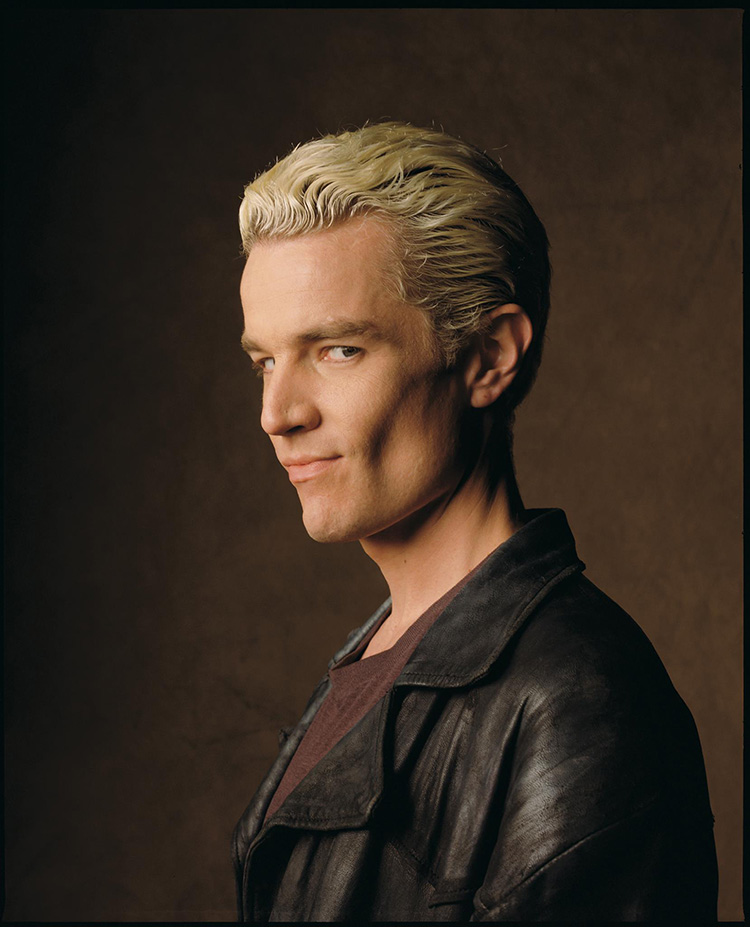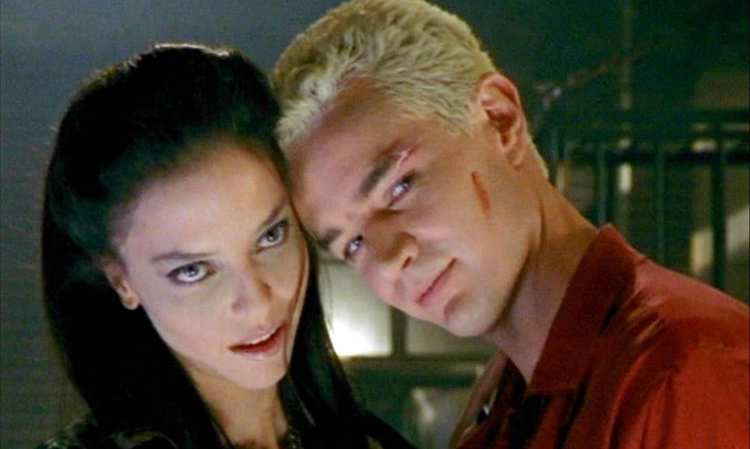
James Marsters doesn’t think many people remember his 2009 film, High Plains Invaders. Not because it wasn’t any good, but because a certain big budget film starring Harrison Ford and Daniel Craig came along after it.
The story of a small Western frontier town in 1892 Colorado besieged by large, alien bug-like creatures, High Plains Invaders rekindles memories of Them! for a reporter speaking to Marsters during a recent Zoom call for SciFiNow. The 1954 classic tells the story of a colony of giant eight-foot ants that mutated in the desert due to radiation from the first atomic bomb test.
“I just though a mashup of cowboys and alien invasion films would be fun to do,” laughs Marsters. “Then Hollywood did Cowboys & Aliens and people forgot about our little film.”
Nobody would ever question the 60-year-old Marsters’ science fiction and fantasy bona fides, however. After finding fame as the British punk rock vampire “Spike” in Buffy the Vampire Slayer and its spinoff show, Angel, he parlayed his new found celebrity into recurring roles on such shows as the Superman-inspired Smallville, where he played supervillain “Brainiac”, the Battlestar Gallica prequel Caprica, in which he appeared as the terrorist “Barnaby Greeley” and the show Torchwood, where he played the gender-blind time traveler, “Captain John Hart.”
A heavily made up Marsters also played Lord Piccolo in the 2009 fantasy action film, Dragonball Evolution. The science fantasy martial arts movie was based on the Dragon Ball manga series, which also spawned three animated television series, one of which the actor lent his voice to: he was the voice of Zamasu in Dragon Ball Super.
An avid gamer, he has also voiced Zamasu and Future Zamasu in the video games Dragon Ball FighterZ and Dragonball Legends, respectively.
In numerous published interviews, Marsters has referred to Dragon Ball as “the coolest cartoon show in 50,000 years.” No doubt his legion of fans also consider him to be pretty cool, considering how many show up at the science fiction or comic conventions he regularly appears at.
Some of Marsters’ convention appearances this year include the Philadelphia Fan Expo, which starts on June 2 and PopConIndy 2023, which runs from August 25 to August 27.

And while he is a very cool guy, away from the camera Marsters is also a cerebral person who says he comes from “a family of intellectuals”. While growing up, he read non-fiction books about such real-life individuals as astronomer and physicist Galileo (Galilei) and Norse explorer Leif Erikson, as well as science fiction tomes like The Lord of the Rings and Ray Bradbury’s Fahrenheit 451. “That one was scary for me,” Marsters acknowledges.
For any bibliophile, but especially an intellectual like Marsters, Fahrenheit 451 is deeply troubling. Bradbury’s novel, about a book-banning fireman who eventually becomes a rebellious reader, has been widely hailed by literary pundits for its examination of the role the mass media plays in shaping public opinion, as well as society’s reliance on technology in a world where individuality and man’s quest for knowledge is frowned upon.
It is a message that clearly resonates with Marsters, especially since censorship and book bans still occur in the United States and elsewhere. “I am of the opinion that most intelligence is used to rationalize the abhorrent behavior of people,” he explains. “People like to make excuses for themselves, they are often completely captivated by their own illusions about themselves.
“We are clever monkeys,” he continues, “but maybe the best thing for us would have been if we remained hunters.”
If that sounds a bit jaded, Marsters can blame the monkeys from the Planet of the Apes series.
“I loved those films, I thought they were fabulous, especially the first one,” he says of Rod Serling’s 1968 film adaptation of French author Pierre Boulle’s novel. “But the overriding theme is that humans should just give up, that the apes are gonna win out in the end.”
Nonetheless, Marsters is an incredibly hopeful person, thanks to a certain show about a starship called the USS Enterprise.

While a Boomer like Marsters only had to turn on the television to be immersed in such classic 1960s science fiction programs as Voyage to the Bottom of the Sea, Lost in Space, The Land of the Giants or The Time Tunnel, it was the original Star Trek that helped fuel his love for the genre.
“Star Trek was all about hope,” he says. “The hope was, and still is, that we can be tolerant of one another and that we can celebrate the diversity of those all around us, even in other galaxies.”
It is a sentiment you’d expect to hear from Marsters, considering he’s done the audio narration for The Dresden Files books. The protagonist of Jim Butcher’s series, Chicago wizard and detective Harry Dresden, espoused much the same point of view in the 14th novel of the series, Cold Days, when he commented about being tolerant in the face of other people’s character flaws:
Even if they are doing something immoral, I’d be an idiot to start criticizing them for it if I wasn’t perfect myself. Smoking is self-destructive. Drinking is self-destructive. Losing your temper and yelling at people is wrong. Lying is wrong. Cheating is wrong. Stealing is wrong. But people do that stuff all the time. Soon as I figure out how to be a perfect human being, then I’m qualified to go lecture other people about how they live their lives.
Marsters’ narration on The Dresden Files audio books has no doubt contributed to the success of the series. And though SciFiNow attempted to contact Butcher regarding the actor’s work, his assistant, Sarah Forsha, did not return an email sent to her.
Of course, Marsters isn’t the only performer to find success narrating audio books. No less than Tony Award-winning actor Jim Dale – who has voiced the Harry Potter series – has also staked a claim to this fast-growing market. And with good reason: according to the international research data and analytics company WordsRated, audiobook revenue was projected to be worth over $5.38 billion as of 2022, and revenue from audiobooks is expected to grow 26.4 percent every year from 2022 to 2030 and reach $35.05 billion in 2030.
So given his success with The Dresden Files, it is surprsing to hear Marsters admit that, compared to appearing on stage, he never realized how difficult narrating a book actually is.
“I got an offer to do a job, and it was fabulous but it isn’t easy,” he admits. “You really are hanging words in the air,” he says of audio book narration.
“You get into a studio and are cold reading the entire book,” continues Marsters. “And the microphone picks up every little mistake. When I perform on stage the actors are all giving each other energy, but narrating a book is a solo gig, and it’s not unusual to get stopped by the director a lot. And it’s tiring, real tiring, it just sucks the energy right out of you.”
Marsters isn’t exaggerating. The length of the first book, Storm Front, which was released in 2008, was eight hours and one minute. By the time the aforementioned Cold Days came out five years later, the length had ballooned to 18 hours and 47 minutes, according to Audible. All told, there are 28 books in the series.
“I love those books,” continues Marsters, who says he employs a film noir approach to his reads – think Humphrey Bogart as Sam Spade in The Maltese Falcon – because Butcher’s writing style is so terse. “There are these long, complicated sentences filled with imagery that are just amazing.
“But I’ve never been satisfied with my narration work the whole time,” he says candidly. “Well, maybe the last two books I felt better about things.”
Marsters’ followers on his social media accounts aren’t complaining. He’s followed by 115,000 people on Twitter, 152,000 individuals on Instagram and 352,000 people on Facebook. “It feels good,” he says, humbly. “I consider myself to be a very lucky person.”
And it’s something he always appreciates. And remembers.
Read our ‘Five Things With James Marsters’ article here and find more exclusive interviews and articles at SciFiNow














